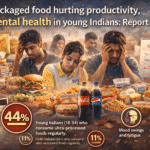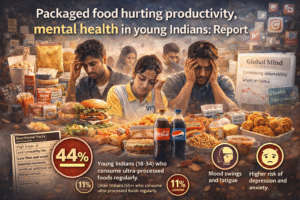By- Dr. Preeti Nagar, Dietitian at NIIMS Medical College & Hospital
Breast cancer remains one of the most prevalent malignancies among women globally. Many factors contribute to its pathogenesis, with diet and hormonal balance playing pivotal roles. Scientific research continues to elucidate how nutritional and endocrine factors interact to influence breast cancer risk, progression, and prevention.
Hormonal Influence on Breast Cancer
Estrogen and progesterone are key hormones involved in breast tissue development and differentiation. The prolonged exposure to elevated estrogen levels, whether endogenous or exogenous. It has been strongly associated with increased breast cancer risk. Estrogen promotes cell proliferation in breast epithelium, and its metabolites can induce DNA damage through oxidative stress, increasing the potential for malignant transformation.
Insulin and insulin-like growth factors (IGFs) are implicated in breast carcinogenesis. Hyperinsulinemia and elevated IGF-1 levels, often resulting from obesity or insulin resistance, enhance cellular proliferation and inhibit apoptosis, thereby contributing to tumorigenesis.

Dietary Factors and Breast Cancer
Nutritional intake significantly impacts hormonal activity and metabolic pathways. Diets high in saturated fats and low in fiber are associated with increased breast cancer risk, potentially through increased circulating estrogen levels. Conversely, diets rich in fruits, vegetables, whole grains, and omega-3 fatty acids exert a protective effect, likely due to their antioxidant, anti-inflammatory, and hormone-modulating properties.
Also Read :
https://thefirstcritic.com/10-simple-daily-habits-that-will-transform-your-life/
Phytoestrogens, such as those found in soy products, have attracted interest for their ability to modulate estrogen receptor activity. These compounds may exert weak estrogenic or anti-estrogenic effects depending on the hormonal milieu, and their impact on breast cancer risk appears to vary by population and individual hormonal status.
Diet and hormonal regulation are deeply interconnected in the context of breast cancer risk. Lifestyle interventions, including maintaining a healthy body weight, engaging in regular physical activity, and adhering to a nutrient-dense, low-fat diet, can favorably influence hormonal profiles and reduce breast cancer risk. Continued research is essential to further understand the molecular mechanisms at play and to develop targeted dietary recommendations for breast cancer prevention.













More Stories
Packaged food hurting productivity, mental health in young Indians: Report
Do only vegetarians suffer from vitamin B12 deficiency? Doctor busts 5 myths and explains how supplements work
Amul, Country Delight & Mother Dairy milk ‘Fail Quality test’, coliform bacteria levels exceed FSSAI limits.